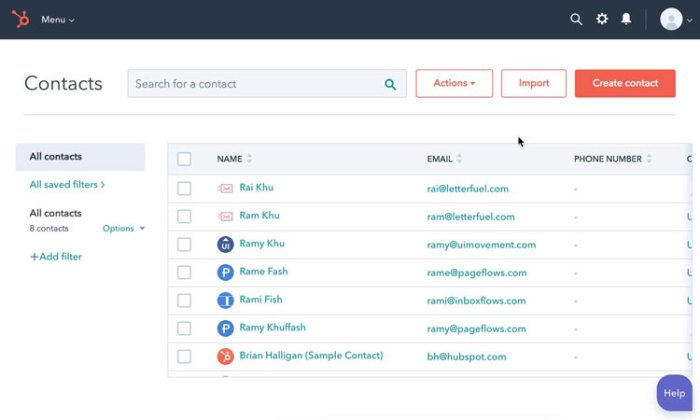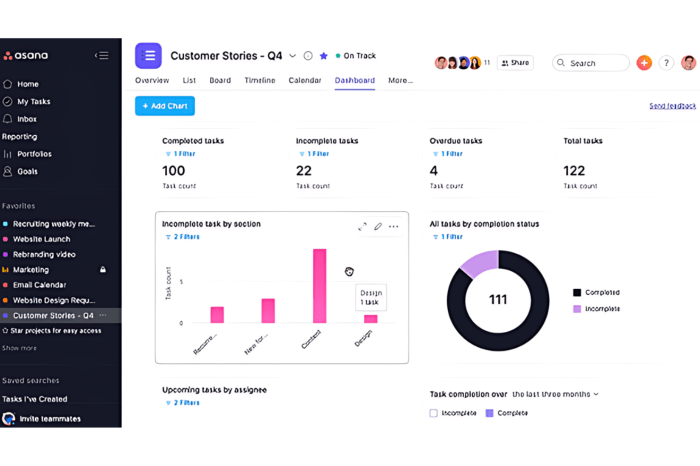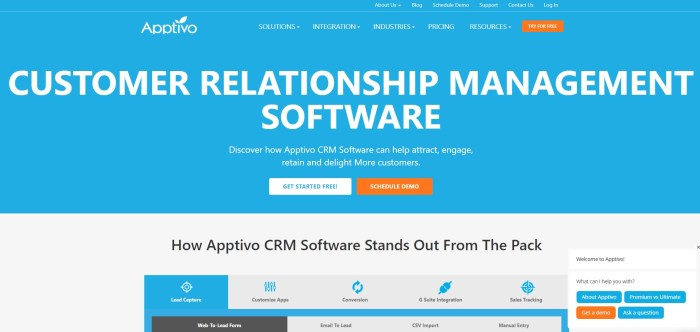In today’s dynamic business environment, efficient project management and robust customer relationship management (CRM) are paramount for success. Choosing the right software to streamline these crucial aspects can significantly impact productivity, profitability, and overall customer satisfaction. This comprehensive guide explores the best project management and CRM software options available, helping you navigate the complexities and select the ideal solution for your specific needs.
We’ll delve into key features, pricing models, and integration capabilities to ensure you make an informed decision.

Source: selecthub.com
Understanding Project Management Software
Project management software helps teams plan, organize, and execute projects effectively. Key features typically include task management, scheduling, collaboration tools, and reporting capabilities. Choosing the right software depends on factors like project complexity, team size, and budget. Popular categories include:
Types of Project Management Software
- Agile Project Management Software: Designed for iterative development, focusing on flexibility and collaboration. Examples include Jira, Asana, and Trello.
- Kanban Project Management Software: Visualizes workflow using Kanban boards, ideal for managing tasks and tracking progress. Trello and Jira also offer strong Kanban functionality.
- Waterfall Project Management Software: Suitable for projects with well-defined stages and linear workflows. While less flexible than Agile, it provides a structured approach.
- Hybrid Project Management Software: Combines elements of different methodologies, offering flexibility to adapt to various project needs. Many modern platforms offer this hybrid approach.
Key Features to Consider in Project Management Software
- Task Management: Assign tasks, set deadlines, track progress, and manage dependencies.
- Collaboration Tools: Facilitate communication, file sharing, and real-time updates among team members.
- Time Tracking: Monitor time spent on tasks to improve efficiency and project budgeting.
- Reporting and Analytics: Generate reports on project progress, performance, and resource allocation.
- Integration Capabilities: Seamlessly integrate with other business tools, such as CRM systems and communication platforms.
- Gantt Charts: Visual representation of project timelines, tasks, and dependencies.
- Budget Management: Track expenses, manage budgets, and monitor financial performance.
Understanding CRM Software
Customer Relationship Management (CRM) software helps businesses manage and analyze customer interactions and data throughout the customer lifecycle. It improves customer service, streamlines sales processes, and enhances marketing efforts. Key features include contact management, sales automation, marketing automation, and reporting and analytics.
Types of CRM Software
- Operational CRM: Automates customer-facing processes like sales, marketing, and customer service.
- Analytical CRM: Analyzes customer data to gain insights and improve decision-making.
- Collaborative CRM: Connects different departments and teams to share customer information and improve collaboration.
- Cloud-Based CRM: Accessible from anywhere with an internet connection, offering scalability and flexibility.
- On-Premise CRM: Installed and hosted on the company’s own servers, offering greater control but requiring more IT infrastructure.
Key Features to Consider in CRM Software
- Contact Management: Store and manage customer information, including contact details, purchase history, and communication logs.
- Sales Automation: Automate sales processes, such as lead generation, opportunity management, and sales forecasting.
- Marketing Automation: Automate marketing tasks, such as email marketing, social media management, and campaign tracking.
- Customer Service Management: Manage customer inquiries, track support tickets, and improve customer satisfaction.
- Reporting and Analytics: Generate reports on customer behavior, sales performance, and marketing effectiveness.
- Lead Management: Track and nurture leads throughout the sales pipeline.
- Sales Forecasting: Predict future sales based on historical data and current trends.
Best Project Management and CRM Software Options
The market offers a wide array of project management and CRM software. Selecting the right one depends on your specific needs and budget. Here are some popular and highly-rated options:

Source: thedigitalprojectmanager.com
Project Management Software, Best project management and crm software
- Asana: User-friendly interface, excellent for collaboration, and offers a free plan.
- Trello: Kanban-based, visual, and easy to learn, suitable for smaller teams.
- Jira: Powerful and flexible, ideal for Agile development and larger teams.
- Monday.com: Highly customizable, visually appealing, and offers a range of features.
- ClickUp: All-in-one platform with a wide range of features, including project management, time tracking, and task management.
CRM Software
- Salesforce: Industry-leading CRM, highly customizable and scalable, but can be expensive.
- HubSpot: Comprehensive CRM with integrated marketing and sales tools, offering a freemium model.
- Zoho CRM: Affordable and feature-rich, suitable for small and medium-sized businesses.
- Microsoft Dynamics 365: Powerful CRM integrated with the Microsoft ecosystem, ideal for larger enterprises.
- Pipedrive: Simple and intuitive CRM focused on sales pipeline management.
Integrating Project Management and CRM Software
Integrating your project management and CRM software can significantly enhance efficiency and provide a holistic view of your business operations. This integration allows for seamless data flow between the two systems, improving communication, tracking progress against customer expectations, and streamlining workflows. Many platforms offer native integrations or utilize third-party apps to achieve this connectivity. Look for features like two-way synchronization of data, automated task creation based on CRM events, and shared dashboards for comprehensive project and customer insights.
Choosing the Right Software: Key Considerations
Before selecting software, consider the following factors:
- Budget: Determine your budget and choose a solution that fits within your financial constraints.
- Team Size and Structure: Select software that can accommodate your team’s size and working style.
- Project Complexity: Choose software with features that match the complexity of your projects.
- Integration Needs: Consider the software’s integration capabilities with other business tools.
- Scalability: Ensure the software can scale to accommodate your future growth.
- User-Friendliness: Choose software that is easy to use and understand for your team.
- Customer Support: Look for software with reliable customer support in case you encounter any issues.
Frequently Asked Questions (FAQ)
- Q: What is the difference between project management and CRM software? A: Project management software focuses on planning, organizing, and executing projects, while CRM software manages customer interactions and data.
- Q: Can I use both project management and CRM software simultaneously? A: Yes, and it’s often highly beneficial to do so for improved efficiency and data integration.
- Q: What are the benefits of integrating project management and CRM software? A: Improved communication, better tracking of progress against customer expectations, and streamlined workflows.
- Q: How much does project management and CRM software cost? A: Pricing varies widely depending on the features, scalability, and vendor. Many offer free plans or freemium models, while others require subscription fees.
- Q: What are some popular integrations between project management and CRM software? A: Many platforms offer direct integrations, or you can utilize third-party tools like Zapier or IFTTT to connect various systems.
Conclusion
Selecting the right project management and CRM software is a crucial decision for any business. By carefully considering your needs, budget, and team dynamics, you can find a solution that optimizes your workflows, enhances collaboration, and ultimately drives business success. Remember to leverage the power of integration to create a truly unified and efficient system.
Call to Action
Ready to streamline your project management and customer relationship management? Explore the software options discussed above and choose the best fit for your business. Start your free trial today and experience the benefits of efficient project execution and enhanced customer engagement!
Expert Answers
What is the difference between project management and CRM software?
Project management software focuses on planning, executing, and monitoring projects, while CRM software manages customer interactions and relationships.
Can project management and CRM software integrate?
Yes, many platforms offer seamless integration, allowing for data sharing and streamlined workflows between project management and customer relationship management functions.
What are some common features of good project management and CRM software?
Common features include task management, scheduling, reporting, contact management, communication tools, sales pipeline tracking, and customer support features.
How much does best project management and CRM software cost?
Pricing varies widely depending on the features, scalability, and vendor. Options range from free plans with limited functionality to enterprise-level solutions with substantial costs.
How do I choose the right software for my business?

Source: ecomstrive.com
Consider your business size, industry, specific needs, budget, and the level of integration required between project management and CRM functionalities. Try free trials or demos before committing to a purchase.
